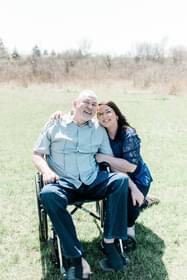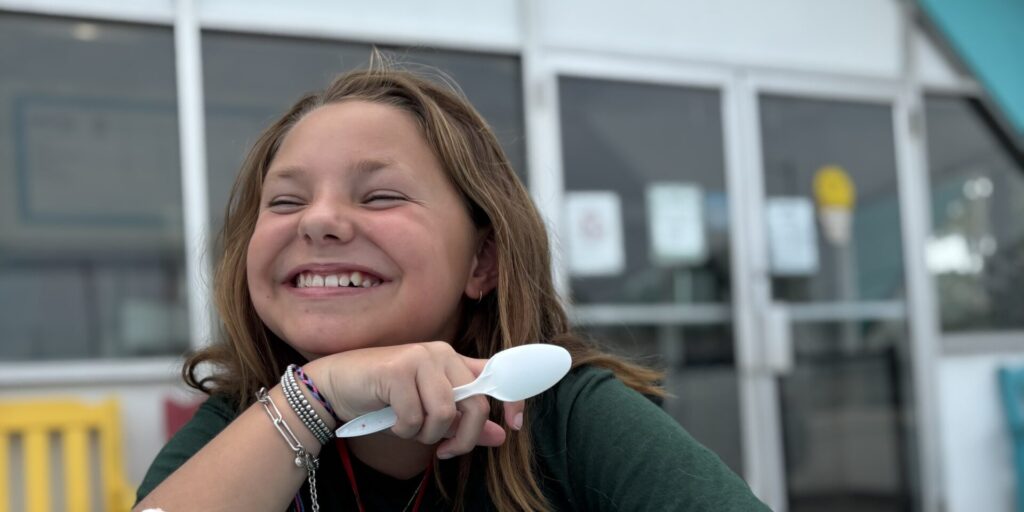
Coping with Family Caregiver Fatigue
By Barbara and Jim Twardowski, RN | Monday, October 23, 2023
Being a family caregiver is a rewarding and simultaneously draining role. While caring for a parent, spouse, sibling, or child living with a neuromuscular disease feels like the ultimate act of love, the constant demands on a caregiver’s time can become overwhelming and lead to fatigue.
The Cleveland Clinic defines caregiver burnout as “a state of emotional, physical, and mental exhaustion that happens while you’re taking care of someone else.”
What leads to burnout?

Christina Trout, RN, suggests meeting with a medical social worker.
Over the last 10 to 15 years, the medical complexity of people living at home with neuromuscular diseases has increased. Many family caregivers learn highly technical skills — managing feeding tubes, helping with airway clearance, performing wound care, changing tracheotomy tubes, and monitoring breathing machines.
Some tasks, like repositioning a loved one during the night, interrupt sleep. A family caregiver’s work also may be physically strenuous — from taking on more household chores to assisting with transfers.
“Some caregivers don’t recognize when they’re physically or mentally tired,” says Christina Trout, RN, a nurse at MDA Care Center at the University of Iowa Stead Family Children’s Hospital. “They may themselves report physical ailments at a higher rate, and that could be due to not getting enough exercise or lifting and helping with transfers without the proper equipment, which can lead to injury.”
Family caregivers also may be reluctant to seek out their own medical care. Often, they don’t take the time to visit a doctor or see a therapist when they need it, allowing physical and mental symptoms to worsen.
Signs of caregiver fatigue
Symptoms of caregiver fatigue are similar to depression and include:
- Feeling tired
- Feeling emotionally depleted
- Changes in sleep patterns
- Weight gain or loss
- Irritability and/or anger toward others
- Withdrawing from friends and family
- Lack of interest in activities they previously enjoyed
- Inability to concentrate

Sabrina Johnson was a caregiver for her father, who had amyotrophic lateral sclerosis (ALS).
Sabrina Johnson, whose late father was diagnosed with amyotrophic lateral sclerosis (ALS), understands the emotional toll of being a family caregiver. “Your life goes from being all about you to all about somebody else all of a sudden, and it’s exhausting.”
During the rapid decline of her father’s health, Sabrina was afraid, anxious, depressed, and sad. Convinced she had to “put on a brave face” for her mother and brother, she suppressed those emotions. Eventually, she says, “I had a huge panic attack and felt like I couldn’t breathe.”
Sabrina learned that bottling up her negative emotions didn’t make them go away — it just made them worse.
“Even if you need to sit on the floor of your closet and close the door, take a minute in the moment to allow yourself to feel,” she advises. Looking back on this period, Sabrina acknowledges that seeing a therapist would have been helpful.
Preventing caregiver fatigue
Avoiding stress may not be possible, but here are several strategies to help caregivers cope with stress and prevent it from turning into fatigue:
- Practice self-care. Rest, eat nutritious foods, and exercise.
- Research local caregiving resources.
- Ask family members and friends for help.
- Maintain a social network.
- Talk to other caregivers.
- Focus on what you are accomplishing.
- Continually assess your situation and set realistic goals for your family’s caregiving needs.
- Be kind to yourself.
Using outside caregivers
Often families don’t seek outside caregivers for two reasons:
- Concerns about their loved one’s safety or well-being with an outside caregiver.
- Concerns about finding funding for or paying for caregiving help.
Family caregivers may need encouragement to acknowledge that the best thing they can do for their loved one is to care for themselves. Setting up a regular schedule for caregiving help gives the family caregiver vital breaks they can use for their own self-care.
Using outside caregivers may have other advantages: It can be beneficial for children and adolescents with disabilities to practice advocating for themselves and teaching someone else how they prefer to have tasks performed. Introducing outside caregivers before a young adult’s transition to living independently will mean it’s not such a big adjustment. In addition, hiring professional caregivers or training a trusted friend or family member ensures the family caregiver has a backup plan to provide care for their loved one if they are unavailable.
The National Institute on Aging has a resource list on paying for long-term care. Christina suggests meeting with a medical social worker who can help find outside caregivers and identify funding sources. Many MDA Care Centers have social workers on their care teams.
You are not alone
Nobody can do everything on their own. Family caregivers can stave off feelings of isolation and fatigue by looking to their community of friends, extended family, and neighbors for additional support.
When someone asks, “How can I help?” have a response ready. Caregivers can compile a list of household chores and errands that someone else can do. Even small 10-minute favors — like unloading the dishwasher or folding laundry — can help give a family caregiver a break.
In-person and online caregiver support groups and forums can be powerful sources of support and advice. Sharing experiences and meeting other caregivers can be a comfort. “You never know who is going to connect to even a small part of the story that you tell,” Sabrina says.
After Sabrina’s father passed away, she changed careers and became a patient care advocate and end-of-life doula. She recently started working for Synapticure assisting patients with neurodegenerative disorders. “I’m a big believer that the best way to care for a patient is to care for everyone who cares for the patient,” she says.
MDA’s Resource Center can play an important role in supporting caregivers, providing one-on-one support via phone or email for individuals and families looking for local caregiving resources, support groups, disease information, and more. (Contact the Resource Center at 833-ASK-MDA1 or ResourceCenter@mdausa.org.)
We truly are a community, and nobody has to navigate the neuromuscular disease journey alone.
Next Steps and Useful Resources
- Caring for the Caregiver, an MDA Virtual Learning webinar, will be held on Nov. 29, 2023. Register for the live event or view the recording here.
- Check MDA’s Education Materials page for the Caregiver Guide.
- MDA’s comprehensive Caregivers Seminar includes segments on communication, balancing self-care with caregiving, and financial planning.
- We all need help. Here are a dozen ways to ask for it.
- Stay up-to-date on Quest content! Subscribe to Quest Magazine and Newsletter.
Disclaimer: No content on this site should ever be used as a substitute for direct medical advice from your doctor or other qualified clinician.




